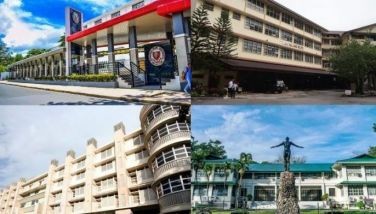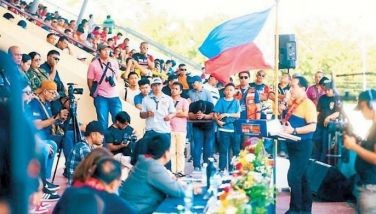Gov’t moves to preserve memories of martial law abuses
MANILA, Philippines - Forty-two years after the declaration of martial law, the government is moving to ensure that Filipinos will not forget the atrocities committed in the darkest period of the nation’s recent history.
Commission on Human Rights Chairman Loretta Ann Rosales said the CHR is working on an oral history project to collate interviews of martial law victims and collect literature, memorabilia and other materials that will give the youth a window into the past.
Rosales herself was a victim of the dictatorship. Her story of being tortured by soldiers on suspicion of being a communist sympathizer will be part of the project.
“The move aims to correct the distortion of history wherein students are made to look at the late dictator Ferdinand Marcos as benevolent, and that martial rule was good for the country,” Rosales said.
She said this was especially true in Marcos’ home region of Ilocos, where students are reportedly made to believe that the country
benefited from martial law.
Rosales said the interviews and materials collected for the project will be stored in a Martial Law Museum that will be put up in Fort Bonifacio, Taguig City. She said they plan to open the museum late next year.
“Once this is realized, important lessons can be derived and we can use this in future curriculum anchored on human rights for elementary, secondary and tertiary students. We will be coordinating with the Department of Education for this to materialize. Actually, we are starting talks about it already,” she said.
The CHR heads the Memorial Commission, which is in charge of projects related to martial law and its victims. The panel’s members are
the Department of Education, National Commission for Culture and the Arts, National Historical Commission and the University of the Philippines Library.
Recognition
The Memorial Commission is preparing to draw up a final list of the human rights victims whose names and stories will be featured in the museum.
Rosales also said that another project, focusing on female martial law victims, is also in the works.
“The good thing is that the state recognizes what really happened during that time, that is why we have this reparation now. It is the first in the whole of Asia where the state or the government has accounted for the atrocities committed. They assume responsibility for the rights violations committed during martial law,” she said.
Rosales said this is the reason why the Human Rights Victims’ Claims Board (HRVCB) is facilitating reparation, monetary and otherwise, for martial law victims.
Approved on Feb. 25, 2013, Republic Act 10368, the Human Rights Victims Reparation and Recognition Act, is an act providing for reparation and recognition of human rights violations committed during the Marcos regime.
Rosales said documenting the human rights violations will help institute reforms in the electoral process.
“Electoral fraud was massive during that time. That should be highlighted, and we have to admit that these things happen until now and we should do something to correct the system,” she said.
Rosales said she hopes documenting the horrors of martial law would help people understand the need to ensure that the upcoming elections should be free of fraud and that Filipinos should “learn how to elect responsible people into office.”
Education
Rosales said human rights education for police officers and soldiers should be intensified.
“Martial law itself is a ‘linchpin’ to connect the past to the present because the failed institutions of the present can be rooted in the distortions of these institutions by one-man rule. This should be rectified,” she said.
The process, however, can only be done with evidence-based documentation, the CHR chief said. The claims board validates and archives evidence to provide “legal basis for the social change that is needed now,” she said.
She said about 16,000 applicants have submitted the required documents to the claims board, but their applications would still have to be evaluated and validated.
The HRVCB, together with the CHR, earlier announced that human rights victims during martial law may begin filing their compensation claims at the HRVCB office in UP Diliman and in regional centers for those based in the provinces.
The six-month application period will end on Nov. 10.
Rosales said that even though martial law ended in 1986, Filipinos are still confronted with problems, large and small, in the government.
“There is patronage politics, corruption. Extrajudicial killings have been continuing, apart from other issues. We need to pay attention to it. All of these have to be corrected. We should work collectively so that such things are properly addressed. We should be vigilant. We would not want a repeat of those dark days in our history. That is why we say, ‘Never again!’” she said.
- Latest
- Trending
































